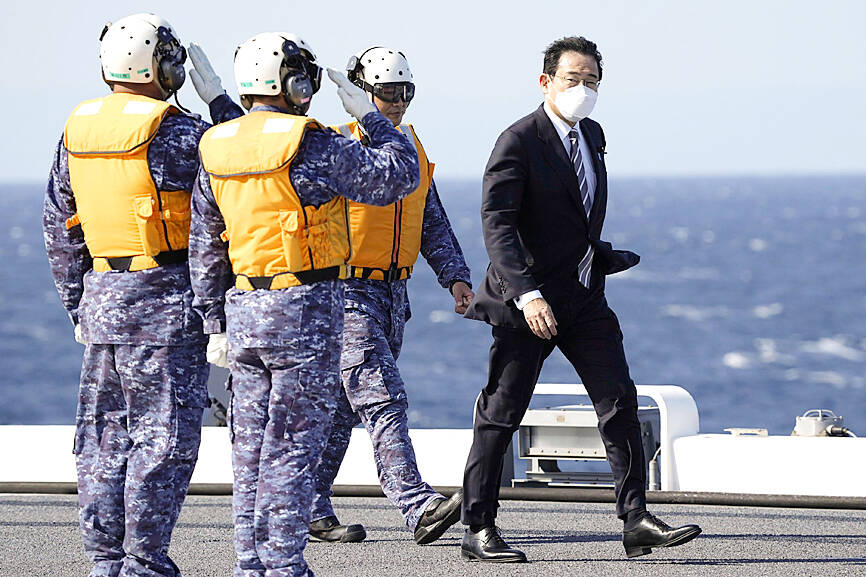Japan yesterday adopted a new five-year ocean policy that calls for stronger maritime security, including bolstering its coast guard’s capability and cooperation with the military amid China’s increasing assertiveness in regional seas.
The new Basic Plan on Ocean Policy, adopted by Japanese Prime Minister Fumio Kishida’s Cabinet, also says that Japan must accelerate the development of autonomous underwater vehicles and remotely operated robots to bolster its surveillance capability.
It cited a list of threats: The Chinese Coast Guard’s repeated intrusions into Japanese territorial waters, growing unauthorized maritime activity by “foreign survey boats” inside Japan’s exclusive economic zone, increasing joint military exercises by China and Russia, and North Korea’s repeated missile launches.

Photo: AP
“The situation in the ocean around Japan is increasingly tense,” Kishida said at a policy meeting yesterday. “It’s time for us to unite our wisdom among the industry, academia and government for ocean policy reform.”
He also noted the need to better use maritime resources to achieve carbon neutrality.
The new ocean policy is in line with Japan’s new national security strategy, which Kishida’s government adopted in December last year in a major break from its self-defense-only principle that the country has maintained under a pacifist constitution since World War II.
The new strategy highlights bolstering Japan’s military power with strike capability and doubling its defense budget within five years. The strategy also calls for closer cooperation between the military and the coast guard in any emergency over Taiwan or other possible conflicts.
The plan also said the capability of Japan’s coast guard, which has been on the front line of border disputes, needs to be improved. It frequently confronts Chinese Coast Guard vessels approaching disputed Japanese-controlled islands in the East China Sea, North Korean poachers and suspected spy boats, and Russian Coast Guard vessels near disputed northern islands.
The Japanese Coast Guard is used for civilian policing at sea and not military combat, and the new plans calling for closer cooperation with the Japanese Self-Defense Forces have raised concerns about its role and safety in a possible conflict.
The ocean plan also says Japan needs to be more aggressive about undersea surveys and using undersea resources for energy, calling for greater use of the exclusive economic zone outside of territorial waters to build offshore wind-power generators.
Japan has repeatedly protested over Chinese research ships entering its waters or the exclusive economic zone close to its boundary for apparent surveys of undersea deposits and other marine resources.

The Central Election Commission has amended election and recall regulations to require elected office candidates to provide proof that they have no Chinese citizenship, a Cabinet report said. The commission on Oct. 29 last year revised the Measures for the Permission of Family-based Residence, Long-term Residence and Settlement of People from the Mainland Area in the Taiwan Area (大陸地區人民在台灣地區依親居留長期居留或定居許可辦法), the Executive Yuan said in a report it submitted to the legislature for review. The revision requires Chinese citizens applying for permanent residency to submit notarial documents showing that they have lost their Chinese household record and have renounced — or have never

A magnitude 5.6 earthquake struck off the coast of Yilan County at 12:37pm today, with clear shaking felt across much of northern Taiwan. There were no immediate reports of damage. The epicenter of the quake was 16.9km east-southeast of Yilan County Hall offshore at a depth of 66.8km, Central Weather Administration (CWA) data showed. The maximum intensity registered at a 4 in Yilan County’s Nanao Township (南澳) on Taiwan’s seven-tier scale. Other parts of Yilan, as well as certain areas of Hualien County, Taipei, New Taipei City, Taoyuan, Hsinchu County, Taichung and Miaoli County, recorded intensities of 3. Residents of Yilan County and Taipei received

Taiwan has secured another breakthrough in fruit exports, with jujubes, dragon fruit and lychees approved for shipment to the EU, the Ministry of Agriculture said yesterday. The Animal and Plant Health Inspection Agency on Thursday received formal notification of the approval from the EU, the ministry said, adding that the decision was expected to expand Taiwanese fruit producers’ access to high-end European markets. Taiwan exported 126 tonnes of lychees last year, valued at US$1.48 million, with Japan accounting for 102 tonnes. Other export destinations included New Zealand, Hong Kong, the US and Australia, ministry data showed. Jujube exports totaled 103 tonnes, valued at

BIG SPENDERS: Foreign investors bought the most Taiwan equities since 2005, signaling confidence that an AI boom would continue to benefit chipmakers Taiwan Semiconductor Manufacturing Co’s (TSMC, 台積電) market capitalization swelled to US$2 trillion for the first time following a 4.25 percent rally in its American depositary receipts (ADR) overnight, putting the world’s biggest contract chipmaker sixth on the list of the world’s biggest companies by market capitalization, just behind Amazon.com Inc. The site CompaniesMarketcap.com ranked TSMC ahead of Saudi Aramco and Meta Platforms Inc. The Taiwanese company’s ADRs on Tuesday surged to US$385.75 on the New York Stock Exchange, as strong demand for artificial intelligence (AI) applications led to chip supply constraints and boost revenue growth to record-breaking levels. Each TSMC ADR represents